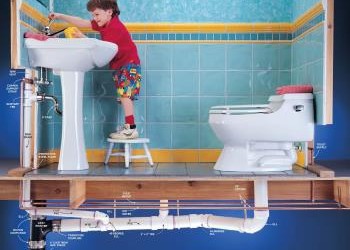Managing Your New Home's Bathroom Plumbing: Essential Guidelines
Managing Your New Home's Bathroom Plumbing: Essential Guidelines
Blog Article
Were you looking for info concerning Essential DIY Bathroom Plumbing Tips Every Homeowner?

For new house owners, understanding and keeping restroom plumbing can save both time and money by preventing costly concerns down the line. Here are some crucial washroom plumbing pointers to help you maintain every little thing running smoothly.
Plan For Winter
Shield your pipelines from freezing during cold weather by shielding pipelines in unheated areas like cellars, attics, and garages. Throughout extreme cold, allow cold water drip from faucets served by exposed pipelines to help prevent freezing.
Set Up Regular Upkeep
Think about organizing annual assessments with a licensed plumbing professional. They can spot issues that you may miss out on, such as surprise leaks or wear and tear on pipes and components. Regular maintenance assists prolong the life of your plumbing system and can stop emergencies.
Acquaint Yourself with the Key Shut-Off Valve
Recognizing where the primary water shut-off valve is located in your house is critical. This permits you to promptly turn off the water system in case of significant leaks or during pipes emergencies, stopping extensive water damages.
Frequently Examine for Leakages
Little leakages can result in big troubles. Frequently check under sinks, around commodes, and near plumbing fixtures for any kind of signs of leakages. Look for moisture, small drips, or corrosion. Catching and repairing leaks early can prevent more major damages and conserve water.
Preserve Your Hot Water Heater
Guarantee your hot water heater is readied to an ideal temperature level (commonly around 120 levels Fahrenheit) to prevent hot and decrease energy use. Flush the container annually to remove sediment build-up, which can minimize the efficiency and life-span of your heating system.
Update Your Fixtures
If your home has older fixtures, take into consideration upgrading to more effective designs. Modern bathrooms, showerheads, and taps are created to make use of much less water while providing good pressure, which can substantially reduce your water costs and environmental footprint.
Beware with Do It Yourself Plumbing Repair Works
While it's appealing to manage all home repair services on your own, be cautious with pipes. Some problems might need professional knowledge, especially if they include primary water lines or sewer fixings. Employing a specialist can in some cases be much more cost-effective than DIY, particularly if it protects against further damages.
Don't Overlook Slow Drains
If your sink or bathtub is draining pipes gradually, it's usually an indication of an obstruction developing. Resolving this very early can protect against a complete clog. Use a plunger or a plumbing's snake to clean out debris. Prevent utilizing chemical drain cleaners as they can damage your pipelines in time.
Know What Not to Flush
Commodes are not waste disposal unit. Stay clear of flushing anything other than toilet paper and human waste. Things like wipes, womanly health items, and cotton swabs ought to be disposed of in the trash to stop clogs and drain back-ups.
Set Up Strainers in Drains
Location strainers in your sink and bathtub drains pipes to catch hair and various other debris prior to they enter your pipes system. Cleaning the strainers routinely will assist stop accumulation and keep water flowing easily.
Verdict
Recognizing and preserving your home's bathroom plumbing can protect against numerous usual concerns. By following these essential ideas, you can ensure your washroom stays useful and effective, conserving you money and time over time.
Essential Plumbing Tips for Homeowners: Keep Your Pipes Flowing Smoothly
As a homeowner, understanding the basics of your plumbing system can save you time, money, and a lot of headaches. Plumbing issues can range from minor annoyances like dripping faucets to major problems like burst pipes that cause significant damage. This guide provides essential tips to help you maintain your plumbing system and tackle common issues.
Understanding Your Plumbing System
Supply System: Brings fresh water into your home from a municipal source or a well. Drain-Waste-Vent System: Removes wastewater and vents sewer gases outside. Fixtures and Appliances: Includes sinks, toilets, showers, dishwashers, and washing machines. Basic Maintenance Tips
Regular Inspections: Periodically check for leaks, corrosion, and other signs of wear and tear. Look under sinks, around toilets, and near water heaters. Know Your Main Shut-Off Valve: In case of a major leak, you’ll need to shut off the water quickly. Ensure everyone in your household knows where the main shut-off valve is located. Prevent Frozen Pipes: In cold climates, insulate exposed pipes and let faucets drip during extreme cold to prevent freezing. Use Strainers: Install strainers in sinks and tubs to catch hair, food particles, and other debris that can cause clogs. Common Plumbing Issues and Solutions
Clogged Drains:
Prevention: Avoid pouring grease down the drain and use drain screens to catch debris. DIY Fix: Use a plunger or a plumbing snake to clear minor clogs. For stubborn clogs, a mixture of baking soda and vinegar can sometimes help. Leaky Faucets:
Prevention: Replace washers and seals regularly. DIY Fix: Turn off the water supply, disassemble the faucet, and replace worn parts.

More Details Report this page